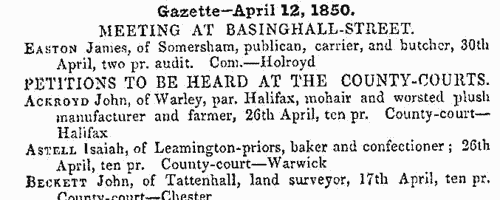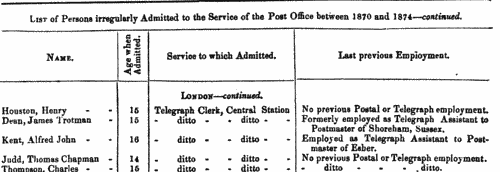Ulyatt Surname Ancestry ResultsOur indexes 1000-1999 include entries for the spelling 'ulyatt'. In the period you have requested, we have the following 18 records (displaying 1 to 10): Buy all | | | Get all 18 records to view, to save and print for £94.00 |
These sample scans are from the original record. You will get scans of the full pages or articles where the surname you searched for has been found. Your web browser may prevent the sample windows from opening; in this case please change your browser settings to allow pop-up windows from this site. Nottinghamshire Marriage Licences
(1577-1700)
Nottingham Archdeaconry, which was almost coextensive with the county of Nottingham, lay in the diocese and province of York, but it had substantially independent jurisdiction for both probate and the issuing of marriage licences. These are abstracts of the archdeaconry marriage licences: they usually state the groom's address, occupation, age, and condition; the bride's address, age and condition; and the names of the churches or parishes at which it was intended the marriage would be celebrated. Not all licences led to marriages. Where the age given is 21, it should be construed as '21 or over'. There was no obligation for the marriage to take place at the parish suggested, but the licence would only be valid within the county. These abstracts have been annotated with extra information found on the marriage bonds. 26 Nottinghamshire parishes (Beckingham, Darlton, Dunham, Eaton, North Leverton, Ragnall, Rampton, South Wheatley, Cropwell Bishop, Bleasby, Blidworth, Calverton, Caunton, Edingley, Farnsfield, Halloughton, Holme, Kirklington, Morton, North Muskham, Norwell, Oxton, South Muskham, Southwell, Upton and Woodborough) lay within the small peculiar jurisdiction of Southwell, which issued its own licences: abstracts of these for the period 1588 to 1754 are also included here.ULYATT. Cost: £4.00.  | Sample scan, click to enlarge

| Nottinghamshire Marriage Licences
(1701-1753)
Nottingham Archdeaconry, which was almost coextensive with the county of Nottingham, lay in the diocese and province of York, but it had substantially independent jurisdiction for both probate and the issuing of marriage licences. These are abstracts of the archdeaconry marriage licences: they usually state the groom's address, occupation, age, and condition; the bride's address, age and condition; and the names of the churches or parishes at which it was intended the marriage would be celebrated. Not all licences led to marriages. Where the age given is 21, it should be construed as '21 or over'. There was no obligation for the marriage to take place at the parish suggested, but the licence would only be valid within the county. These abstracts have been annotated with extra information found on the marriage bonds. 26 Nottinghamshire parishes (Beckingham, Darlton, Dunham, Eaton, North Leverton, Ragnall, Rampton, South Wheatley, Cropwell Bishop, Bleasby, Blidworth, Calverton, Caunton, Edingley, Farnsfield, Halloughton, Holme, Kirklington, Morton, North Muskham, Norwell, Oxton, South Muskham, Southwell, Upton and Woodborough) lay within the small peculiar jurisdiction of Southwell, which issued its own licences: abstracts of these for the period 1755 to 1833 are also included here.ULYATT. Cost: £4.00.  | Sample scan, click to enlarge

| Cambridgeshire Voters: Parson Drove
(1832)
The poll on the election of three knights of the shire to serve in Parliament for the county of Cambridge, was taken at Cambridge, Royston, Newmarket, Ely, Wisbech and Whittlesea 18 and 19 December 1832. The candidates were Henry John Adeane esquire, Richard Greaves Townley esquire, Charles Philip Yorke esquire and John Walbanke Childers esquire. This poll book sets out the names of the voters in alphabetical order hundred by hundred and parish by parish. The voters' full names are stated, surname first. The right hand column records their votes. The new qualification for suffrage in the counties, after the passage of the 1832 Great Reform Bill, was the possession of a freehold estate worth 40s a year or more, a copyhold or long leasehold of £10 a year or more, or a tenancy or short leasehold of £50 a year or more.
ULYATT. Cost: £6.00.  | Sample scan, click to enlarge

| Bankrupts
(1840)
Bankruptcy notices for England and Wales: bankruptcy often caused people to restart their lives elsewhere, so these are an important source for lost links
ULYATT. Cost: £6.00.  | Sample scan, click to enlarge

| Bankruptcy Meetings
(1841)
Meetings about bankrupts' estates in England and WalesULYATT. Cost: £6.00.  | Sample scan, click to enlarge

| Bankrupts
(1841)
Bankruptcy notices for England and Wales: bankruptcy often caused people to restart their lives elsewhere, so these are an important source for lost links
ULYATT. Cost: £6.00.  | Sample scan, click to enlarge

| Insolvents in England and Wales
(1850)
Perry's Bankrupt and Insolvent Gazette, issued monthly, included lists of insolvencies and stages in the process whereby the insolvents petitioned for release from debtors' prison. The insolvent is generally referred to by name (surname first), address and trade. This is the index to the names of the insolvents, from the issues from January to December 1850.ULYATT. Cost: £6.00.  | Sample scan, click to enlarge

| Civil Service Appointments
(1862)
The Civil Service Commission published an annual list of all persons who had obtained certificates of qualification for appointment in the various public departments. The list gives full name (surname first); department (such as Post Office, or Inland Revenue); situation (such as Letter-carrier, or Clerk); and date of certificate. Candidates whose names are preceded by a dagger obtained appointments as the result of competition; a double dagger indicates open competition. Those whose names are preceded by an asterisk obtained honorary additions to their certificates either for proficiency in extra subjects chosen by themselves, or for marked proficiency in the prescribed subjects. Then follows a further list of these candidates who had obtained Honorary Additions to their Certificates in this way: giving name (surname and initials); position in the service (department and situation); subjects for which honorary additions were made; and 'extent of knowledge displayed' (such as Creditable, Fair, or Very Creditable). 1 January to 31 December 1862.ULYATT. Cost: £4.00.  | Sample scan, click to enlarge

| London Telegraph Clerks
(1870-1874)
This list of persons irregularly admitted to the service of the Post Office from the date of the transfer of the telegraphs, 29 January 1870, to 30 September 1874, extends to 3653 names. The return gives full name (surname first, married women indicated by Mrs.); age when admitted; service to which admitted; and last previous employment.ULYATT. Cost: £6.00.  | Sample scan, click to enlarge

| Debtors, Insolvents and Bankrupts
(1880)
Bills of sale (binding assets to a creditor/lender), insolvencies and bankruptcies in England and Wales, January to March 1880ULYATT. Cost: £6.00.  | Sample scan, click to enlarge

|
| 1 | 2 |  |
Research your ancestry, family history, genealogy and one-name study by direct access to original records and archives indexed by surname.
|












